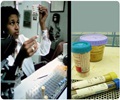Patients suffering from ulcerative colitis seem to be willing to try out “fecal microbiota transplantation,”
Patients suffering from ulcerative colitis seem to be willing to try out “fecal microbiota transplantation,” though they may have concerns about donor selection, screening, and methods of delivery.
Bacterial aggregates derived from fecal matter have been used sporadically to treat gastrointestinal disease for more than 50 years. These were often last-ditch efforts aimed at restoring microbial balance for patients with raging intestinal infections. More recently, the approach has produced lasting remissions for a small number of patients with a common disease: ulcerative colitis.“Once patients get past the yuck factor they find the concept appealing,” said study author David Rubin, MD, associate professor of medicine at the University of Chicago. “They perceive it as ‘natural,’ similar to probiotics. Patients with severe inflammatory bowel disease tend to develop a high tolerance for therapies that others might consider unorthodox.”
Fecal microbiota transplantation (FMT)—also known as fecal bacteriotherapy, among other names—is an effort to calm a troubled bowel by reintroducing the vast diversity of collaborative bowel inhabitants after the usual mix has been disturbed. More than 1,000 different strains of bacteria co-exist peacefully in the typical healthy bowel. But when the delicate balance is altered, by antibiotics or other causes, a few strains can become dominant, leading to severe diarrhea, inflammation and tissue damage.
The first FMT cases, dating back to 1958, were used to treat life-threatening infections caused by aggressive bacteria that had overwhelmed the bowel, driving out the competition. When antibiotics were unable to control the infection, physicians were able to restore balance by injecting the full range of gut bacteria. They did this by collecting fecal matter from a healthy donor and injecting it into the patient’s colon.
In 2003, a team led by Australian physician Thomas Borody published a report on successful treatment of six patients with longstanding ulcerative colitis with this approach. “Complete reversal of UC was achieved in all 6 patients following the infusion of human fecal flora,” the authors reported. “These 6 cases document for the first time the total disappearance of chronic UC without the need for maintenance treatment.”
“This is a fascinating idea, and the early studies show great promise, but we found that no one had looked at the social issues surrounding fecal transplantation,” said Rubin. “Before we offer this, we wanted to find out how patients understood the process and take a look at the ethical issues that could also be raised by this therapy.”
Advertisement
Rubin and colleagues Stacy Kahn, MD, and Rita Gorawara-Bhat, PhD, organized six focus groups in 2009-2010 with patients or parents of children with ulcerative colitis to “explore the attitudes and concerns” raised by this approach. They published their findings in the June issue of the journal Inflammatory Bowel Disease.
Advertisement
The major concerns were focused on how donors would be selected and screened. Patients wanted healthy donors, usually family members, and asked that even their diet and medications be considered. A donor who had eaten peanuts recently, for example could be hazardous for a recipient with peanut allergies.
Physicians recommend a workup similar to that of an organ donor, with careful screening for multiple pathogens, including HIV, hepatitis and other viruses, as well as various parasites and worms.
The “yuck“ factor came up in the focus group discussions of bacterial delivery. Patients and parent were comfortable with the idea of a “spray” colonoscopy or delivery via enemas, but were disturbed by the idea of using a naso-gastric tube for the transfer of fecal bacteria, although this method has been used to treat Clostridium difficile infections.
“What our study ultimately tells us is that patients are not only tolerant of this therapy but are eager for it to become available,” Rubin said. “A few have already tried this strategy at home, using ‘protocols’ they found on the internet and tools available at any drug store.”
“We hope to begin offering FMT this fall,” he said, “in a carefully controlled, clinical-trial setting.”
“We are getting at least one phone call a week from patients asking about the treatment and when we are going to start treating patients,“ said co-author Stacy Kahn, MD, instructor of pediatrics at the University of Chicago.
There are many things we do not yet know about the risks and benefits of FMT, the authors agreed. The safety of such a treatment and broader implications of risk remain unconfirmed, so careful preparation and more study is necessary before this can be offered to patients with ulcerative colitis.
“Many patients do benefit from proven traditional therapies,” Rubin said, “which should always be considered before experimental treatments, no matter how attractive they may sound.”
The National Institutes of Health, the University of Chicago’s Clinical and Translational Science Award, and the Gastrointestinal Research Foundation supported this study
Source-Medindia










